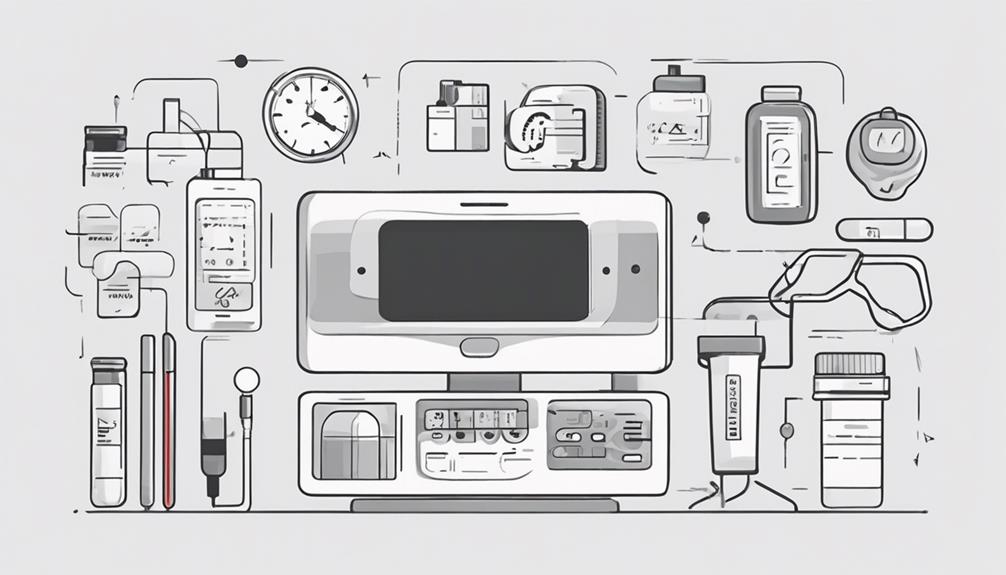Imagine a scenario where a person with type 1 diabetes diligently manages their condition through insulin therapy and regular medical check-ups. Despite their efforts, they still face a shortened life expectancy compared to those without diabetes.
What factors contribute to this disparity in longevity? The interplay between blood sugar control, complications management, cardiovascular health, and lifestyle choices all play crucial roles in determining the impact of type 1 diabetes on life expectancy.
Key Takeaways
- Early diagnosis and timely treatment improve life expectancy.
- Blood sugar control through monitoring and management is crucial.
- Preventing and managing complications is essential for longevity.
- Lifestyle modifications positively impact health and increase life expectancy.
Impact of Early Diagnosis

How does the early diagnosis of Type 1 diabetes impact life expectancy for individuals?
Early diagnosis of Type 1 diabetes plays a crucial role in improving life expectancy. Research indicates that timely identification of Type 1 diabetes allows individuals to start treatment promptly, reducing the risk of complications and improving overall health outcomes. By initiating treatment early, individuals can better manage their blood sugar levels, which is essential in preventing long-term complications associated with diabetes.
Moreover, early diagnosis provides individuals with more treatment options. Being diagnosed early allows healthcare providers to tailor treatment plans to the individual's specific needs, ensuring better control of the condition. This personalized approach can lead to improved quality of life and increased life expectancy for individuals living with Type 1 diabetes.
In addition to the physical benefits, early diagnosis also has a positive psychological impact. Understanding one's condition early on can help individuals cope better with the emotional challenges that come with managing a chronic illness. It allows for better acceptance of the condition and promotes mental well-being, ultimately contributing to a higher quality of life for those with Type 1 diabetes.
Influence of Blood Sugar Control
Effective blood sugar control significantly impacts the management of Type 1 diabetes and is crucial for improving long-term health outcomes. Maintaining stable blood sugar levels is essential in reducing the risk of complications associated with diabetes. To achieve optimal blood sugar control, consider the following:
- Monitor Glucose Levels: Regularly check your blood sugar levels to track patterns and make informed decisions about your treatment plan.
- Balanced Diet: Make mindful dietary choices by incorporating whole foods, fruits, vegetables, and lean proteins to help regulate blood sugar levels.
- Physical Activity: Engage in regular exercise routines to improve insulin sensitivity and better manage blood sugar levels.
- Medication Adherence: Follow your prescribed medication regimen consistently to support blood sugar control.
- Consult Healthcare Providers: Regularly consult with healthcare professionals to adjust your treatment plan as needed based on your blood sugar levels and overall health status.
Role of Complications Management

Managing complications is essential for enhancing the overall quality of life for individuals with Type 1 diabetes. Preventive measures play a crucial role in minimizing the risk of complications associated with this condition. Regular monitoring of blood sugar levels, following a balanced diet, engaging in regular physical activity, and attending medical check-ups are vital preventive steps. Additionally, staying informed about the potential complications, such as diabetic retinopathy, neuropathy, and kidney disease, empowers individuals to take proactive measures.
When complications arise, various treatment options can help manage them effectively. For instance, medications to control blood pressure and cholesterol levels may be prescribed to prevent or slow down the progression of cardiovascular issues. For diabetic neuropathy, pain management strategies and medications can help alleviate discomfort. In cases of diabetic retinopathy, timely intervention such as laser therapy or surgery may be necessary to prevent vision loss.
Impact on Cardiovascular Health
To understand the impact of Type 1 diabetes on cardiovascular health, examining the relationship between insulin regulation and heart function is crucial. When managing Type 1 diabetes, being aware of the effects on heart health is essential. Here are key points to consider:
- Insulin Resistance: Type 1 diabetes can lead to insulin resistance, impacting heart health by affecting glucose uptake in cardiac cells.
- Blood Pressure: Individuals with Type 1 diabetes are at a higher risk of developing high blood pressure, which can strain the heart over time.
- Cholesterol Levels: Diabetes can alter cholesterol levels, increasing the likelihood of plaque buildup in arteries and affecting vascular health.
- Inflammation: Chronic inflammation associated with diabetes can contribute to the development of cardiovascular diseases.
- Risk of Heart Disease: Type 1 diabetes significantly increases the risk of heart disease, highlighting the importance of proactive management to safeguard cardiovascular health.
Understanding these factors can empower you to make informed decisions to mitigate the impact of Type 1 diabetes on your cardiovascular well-being.
Importance of Lifestyle Modifications

Understanding the impact of Type 1 diabetes on cardiovascular health underscores the necessity of implementing lifestyle modifications to enhance overall well-being. Dietary habits play a crucial role in managing Type 1 diabetes and improving life expectancy. A balanced diet rich in fruits, vegetables, whole grains, and lean proteins can help regulate blood sugar levels and reduce the risk of complications associated with the condition. Monitoring carbohydrate intake and spacing meals evenly throughout the day can aid in better glucose control and overall health.
In addition to dietary modifications, incorporating regular exercise routines into your daily life can have significant benefits for individuals with Type 1 diabetes. Physical activity helps lower blood sugar levels, improve cardiovascular health, and maintain a healthy weight. Engaging in aerobic exercises like walking, cycling, or swimming, as well as strength training activities, can contribute to better glucose management and overall well-being.
Frequently Asked Questions
Can Type 1 Diabetes Be Prevented or Reversed With Certain Lifestyle Changes?
You can't prevent or reverse type 1 diabetes with lifestyle changes. It's an autoimmune condition where the body attacks insulin-producing cells. However, managing it through insulin therapy, monitoring blood sugar, and a healthy lifestyle can help control the condition.
How Does Type 1 Diabetes Affect Mental Health and Emotional Well-Being?
When living with type 1 diabetes, mental health can be impacted, leading to stress and emotional challenges. Coping strategies like mindfulness, therapy, and peer support can help manage these effects and improve overall well-being.
What Advancements in Medical Technology Are Being Made to Improve the Management of Type 1 Diabetes?
In the realm of diabetes management, medical marvels like continuous glucose monitoring and insulin pumps are revolutionizing care. These innovations offer precise control and real-time insights, empowering you to navigate your journey with greater ease.
Are There Any Specific Dietary Recommendations or Restrictions for Individuals With Type 1 Diabetes?
When managing type 1 diabetes, focus on meal planning, carb counting, and utilizing tools like an insulin pump or continuous glucose monitor. These strategies help regulate blood sugar levels, empowering you to make informed dietary choices.
How Does Type 1 Diabetes Impact Fertility and Pregnancy in Both Men and Women?
Having type 1 diabetes may impact relationships due to fertility concerns. Research shows that men and women with type 1 diabetes may face challenges in conceiving. Understanding these effects can guide informed decisions about family planning.
Conclusion
In conclusion, early diagnosis, maintaining blood sugar control, managing complications, and prioritizing cardiovascular health all play a crucial role in improving life expectancy for individuals with type 1 diabetes.
Think of managing type 1 diabetes like tending to a delicate garden – with proper care and attention, you can help it thrive and flourish.
By making lifestyle modifications and staying proactive in your health management, you can help extend your life expectancy and live a fulfilling life.